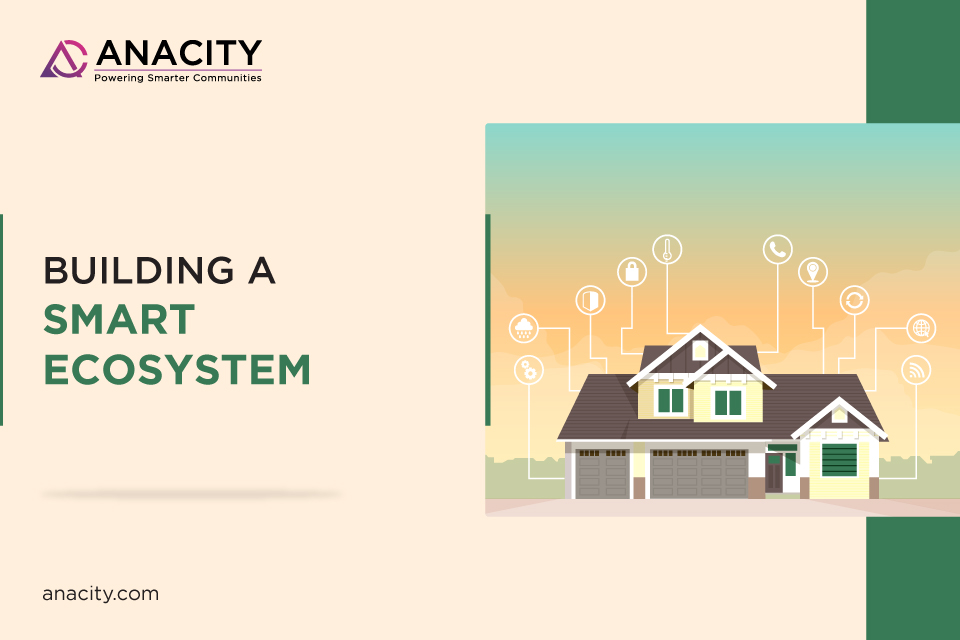We live in the era of sci-fi when technology seems to be two steps ahead of our imagination. Smart homes, where everything from the garage door to the bedside lamp, are connected to our phone, are no longer confined to the realm of futuristic movies. With rapid advances in IoT technology, smart homes are now fast becoming a reality. For many homeowners, getting their home outfitted with smart tech is now seen as the pinnacle of house pride.
But there are many other benefits of a smart home that go far beyond bragging rights. Technology can be instrumental in more efficient energy consumption, a key requirement in Dubai where the built environment accounts for 70% of all energy consumption. Investing in a smart building is also important in ensuring robust resale values with prospective buyers increasingly preferring embedded technologies in their daily lives. As smart homes become the norm, it is high time we start thinking about upgrading our homes.
What is a smart home?
A smart home is equipped with web-enabled devices that can be monitored and controlled through a central automation controller. As part of home automation, these devices include lighting, heating, locks, security cameras, kitchen appliances, and entertainment. Virtually, every gadget that we use today can be replaced by a web-enabled device.
The most unique aspect of a smart home is the manner in which all devices are connected via a smart home hub, a remote-controlled automation device. The smart home hub is designed to monitor, process, and collect data through wireless communication with connected devices. As advances in Artificial Intelligence with its components of machine learning and IoT gain at lightning pace, more and more homes are now connected with an intelligent network that are designed for the residents’ convenience.
Sustainable homes
Can technology help us improve sustainability in our daily life? Yes, when used appropriately. Quite often the problem with excessive energy consumption is our inability to set limits or to stay within them. In Dubai, air-conditioning has been a major source of energy consumption, accounting for 80-85% usage in built areas. Not surprisingly, a major thrust of the UAE’s government’s conservation efforts are aimed at reducing HVAC usage.
Smart devices can make a difference through two key means – by ensuring that consumption is regulated within limits and by providing us with accurate data. Smart appliances, such as lights or air conditioning can be programmed to turn-off at a certain time or in response to a certain trigger like the optimum temperature. The other major enabler here is the availability of data. Smart devices can give us an accurate reading of our consumption patterns. Information can be a powerful weapon in leveraging conscious consumption, prompting reduced energy wastage over time.
Investing in the future
If we were to view the biggest disadvantages of a smart home, high initial investment will possibly feature at the top. However, it would be more prudent to view it as a long-term investment in our future. Apart from the savings accrued from reduced energy consumption, investing in a smart home is also becoming critical to sustain and even increase the real estate value of a property.
Tech preference will further become critical as millennials reach the prime buying age with the gen-Z following close behind. A smart home will therefore see increasing preference with prospective buyers of tomorrow, gaining value over its basic counterparts. Such homes are likely to sell quickly with minimum time and fuss. A smart home is also in-demand in Dubai’s high-value rental market and likely to attract tenants quickly.
These advantages show why despite its high initial investment, smart homes are gaining traction among homeowners in Dubai. Apart from the convenience, a smart home is an investment in the future, one that can nudge us towards a sustainable lifestyle even as it adds value to the property.
Digital-first Communities with ANACITY
How do we take the tech-first approach across communities? This is where ANACITY plays a crucial role, creating a digital support for property managers and residents in gated communities. It allows residents to lodge complaints, approve visitors, and communicate. At the same time, property managers benefit from highly efficient admin tools like automated billing and collections, resolving complaints, and visitor tracking.
To know more about ANACITY modules, write to us at sales@anacity.com.

